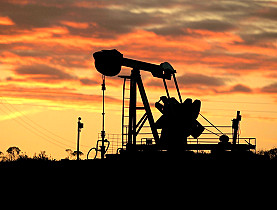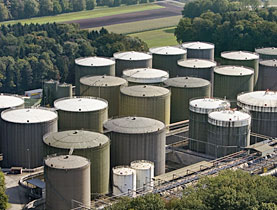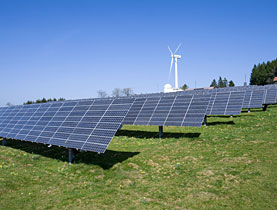Oil-addicted world faces crude awakening

As petrol prices reach record levels, the maker of an award-winning Swiss film on peak oil talks to swissinfo about an issue which is affecting everyone, everywhere.
Described as “one of the most frightening films you are ever likely to see” by British newspaper The Guardian, A Crude Awakening is essential viewing for anyone wanting to understand the current crisis and why the future is far from rosy.
The documentary, known as The Oil Crash outside English-speaking countries, argues that we are moving from a period of cheap, abundant energy to a period of expensive, hard-to-get energy. Since not only politicians but almost everyone – business, the oil multinationals – have failed to anticipate the problem and invest in alternative energy sources, it’s going to hurt.
Wars over resources, inflation, economic slowdown, food shortages and a collapsing airline industry are just some of the expected consequences of an addicted world being forced to wean itself off oil.
A Crude Awakening, which won the Zurich Film Prize in 2006 and has been distributed in more than 20 countries, was made by Swiss journalist Basil Gelpke and Irish-born filmmaker Ray McCormack, who has lived in Zurich since 2000.
McCormack, who has a degree in environmental policy, tells swissinfo how kicking the fossil fuel habit is going to require a radical change in lifestyle – for everyone.
swissinfo: How many times a day do you say “I told you so”?
Ray McCormack: We don’t say that, but when people said we were scaremongering and just helping the oil companies make more profits, we would say “well we hope we’re wrong, but it doesn’t look like we are”.
But it’s not us: it’s the people in the film. It isn’t my concept that oil exists in finite quantities and sooner or later production will reach a point at which it can no longer rise and it then will slowly fall off while demand will stay the same or keep rising. That’s what peak oil is and it’s happening right now. People say you should never let facts get in the way of a good story, but for us the facts were the story!
swissinfo: At the end of the film I thought ‘that’s it – we’re doomed’. What reaction were you aiming for?
R.M.: The idea was to shock people into awareness at the very least and to question what they could do to respond to what is going to be quite a tough situation. If you wait until it’s upon you, it’s too late.
The most telling statistic for me came from a report commissioned by the US government released in 2005 predicting how far in advance you have to prepare for peak oil to be able to deal with it. It’s 20 years. And now we’re already at the peak and we’re not doing anything meaningful about it.
swissinfo: How do you see the world in 20 years – is Zurich going to look like something out of Mad Max? Can one be optimistic?
R.M.: In some ways yes, because there are already some people who are changing the way they live. I recently saw a full-page article in our local Zurich paper about why taking exotic holidays is not such a clever thing to do anymore.
swissinfo: Have you changed the way you live?
R.M.: I don’t own a car – and of course in Switzerland it’s a lot easier than in other countries. In the United States they’re going to find it extremely difficult because of the way their whole society is constructed – their cities were designed after the invention of the car, unlike in Europe. I also have an allotment and am learning how to grow food – I think it’s something we should all learn to do right away.
swissinfo: How will the average Swiss notice the effects of peak oil?
R.M.: It’s prices. The price of food, electricity, transport – and it’s happening already. One of the solutions is car sharing. People are going to have to realise that having two cars sitting in the drive depreciating might not be such a sensible way to continue. Taxing cars more according to their fuel intake would also help.
We have to change from being passive consumers to active citizens and take responsibility for all our consumer behaviour.
swissinfo: All the talk is of the United States, Russia, China – what can little Switzerland do?
R.M.: This might be a small country but it has a huge effect in terms of the global influence of Swiss-based non-governmental organisations. We also have some of the best engineering minds in the world and the Swiss government really should be throwing money at these people and challenging them to find renewable solutions.
swissinfo-interview: Thomas Stephens
In January 1999 oil stood at $16 a barrel; it has been going up ever since.
On January 2, 2008, a barrel of oil broke through $100 and set a new high of $147.27 on July 11, well beyond the previous inflation-adjusted peak of $101.70 in April 1980, a year after the Iranian revolution.
The simplified reason for the soaring price is that demand is increasing while there are concerns over supply (see “peak oil” box).
The Energy Information Administration (EIA) projects that world demand for oil will increase by 37% over 2006 levels by 2030, from 86 million to 118 million barrels a day. Demand is highest in emerging economies such as China and India, driven in large part by the transportation sector.
The fact that global oil production will sooner or later start declining is the main long-term fundamental cause of rising prices. In the short term, there are supply concerns in Brazil, Nigeria and the Middle East.
The finger has also been pointed at financial speculators who have been buying dollar-denominated crude contracts as a hedge against inflation and a weakening dollar.
Peak oil is the point in time when the maximum rate of global petroleum extraction is reached, after which the rate of production starts an irrevocable decline.
The fact that oil production will peak is not disputed. The exact timing of the peak however is hard to say because Opec countries are hardly open about the size of their oil reserves. Estimates range from thinking it has already happened, possibly around 2005, to far enough in the future to allow alternatives to be found.
The problems, which will start when oil supply cannot meet the world’s energy demand and no alternative energy source can fill the gap, include increasing “resource wars”, fewer investments and purchases and economic slowdown or recession.
Higher fuel costs – and connected higher food costs – will lead to inflation and unemployment, not to mention acute food shortages.
Transport costs will go up, leading to a possible “reversion” of globalisation and the regionalisation of trade, arguably harming economic prosperity and opportunity in developing nations.

In compliance with the JTI standards
More: SWI swissinfo.ch certified by the Journalism Trust Initiative




You can find an overview of ongoing debates with our journalists here. Please join us!
If you want to start a conversation about a topic raised in this article or want to report factual errors, email us at english@swissinfo.ch.